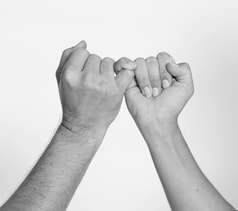A Counter-intuitive but plausible solution to the problem of violence against women

By Roger Butler (Curious Creatures)
It's not hard to make the case that women suffer a lot of violence and mistreatment at the hands of men.
Even direr, but a little less known, is that things are not getting better. Despite seventy years of modern feminism and some progressive social policies, data from the Australian Bureau of Statistics and state-based law-enforcement agencies (such as NSW and VIC police) shows a miserable story; rates of violent crime, partner-based crime, and sexual assault are either flat-lining or increasing. (Yes, some of this can be put down to better recognition of what violence against women looks like, which in turn has resulted in better reporting methods. But whatever way you slice this information, it's very hard to find statistics that clearly make the case that things are getting better).
Even if you’re sceptical that it’s getting worse, it’s a near certainty you know women that have been through violence or sexual assault. The problem is devastating and omnipresent, as the #metoo campaign highlighted.
However, here’s where I’m going to diverge from the well-trod path. I would like to outline what our current attempts at solutions consist of, highlight why I believe they’re failing, and then propose something counter-intuitive as a solution to ‘the problem with men’. I’ll share with you what I’ve discovered through road-testing my ideas with thousands of men – including some remarkable successes.
Most of us acknowledge that men are privileged in this world. We are aware of social and structural dynamics that make life easier for men, or that give them unfair advantages. These biases are around us from cradle to grave: from children's books through to how much superannuation we retire with, and so much in-between.
We also know that most violence against women – especially if we’re referring to physical violence – comes from men. We are sometimes at a loss to make sense of this, resorting to describing it as something that happens… because it can. Our narrative is that the system is so biased in favour of men, and some men have such an apparent hatred of women, that bad behaviour is either ignored, or tacitly allowed, or impossible to police. Perhaps the perpetrators gain power, or a cheap thrill... For whatever reason, they seem to move through the world (and the women around them) like bullies through a school-yard.
It's a rather hopeless situation. Men already have so much stacked in their favour; trying to work out how to sign them up to behaviour-change is like trying to buy a birthday gift for the spoilt child that already has everything. These men will benefit from things staying the same, so we have very little leverage – we have no drawcards we can use to inspire change. So our current strategy looks like this: We come together to compare notes. We develop some intelligent structural analyses of what's going on. We legislate for equality where possible, we educate our law enforcement and judicial agencies on how to respond better to violence, and we demand more rigorous prosecution and harsher penalties. We beg, plead, and demand that bad men stop behaving so badly, but mostly we just wind up frustrated and disempowered.
We have been very active in our efforts, but the sad truth is that we haven’t succeeded in achieving our goals. It’s hard to face, but our best efforts have not produced the results we wanted. Like scientists at the end of an imperfect experiment, we need to go back and look at our methodology and background assumptions – those things that we were so sure of that we didn’t question them when we designed our experiments.
But far from being a depressing dilemma, this is where we will find hope! Yes, the data backs up what we believe about how much women suffer in this culture, but there is some very confusing data on how men are faring. In short, the numbers don't seem to support the idea that men are simply rolling around in their privilege, and abusing others because they have nothing better to do.
Some of this data is counterintuitive. But if we burrow in, it will show us solutions that are otherwise impossible to imagine.
The first piece of data (from the Australian Government) is that men die younger - by about five years in Australia, which is around 7%. This is interesting, because in every other demographical analysis (such as this one from The University of Columbia), we can see that the privileged class live longer.
Some observers dismiss these shortened life-expectancy figures as being the results of reckless male behaviour. Although this has to be partially true, given that the two largest causes of death for men are cancer and suicide, to describe them as 'reckless' causes of death sounds a little lacking in compassion.
Suicide itself is an interesting second piece of data about what life is like for men. In general it’s accepted that three to four times as many men take their own lives as women do. That just doesn’t add up; if men were simply a happy, privileged bunch of lads, they wouldn’t be taking their own lives in such numbers. And when you burrow into why men are doing this, a picture emerges of individuals that are out of options, that don't have the supports they need, and who have profoundly low self-esteem, self-worth, and hope.
The third piece of data is that men make up around 95% of the prison population (and are vastly over-represented within the justice system, generally). Again, this is not a harbinger of a happy people – with every other group that is over-represented within the justice system (such as Indigenous Australians, those exposed to poverty, or those of us with mental health challenges) we accept that context and circumstances play a substantial role in an individual’s criminality. Here’s an intriguing question: Is it possible that a similar contextual understanding could explain some of what we’re seeing in men’s behaviour patterns also?
Fourthly, the same sources that show us that physical violence against women is not improving also show us that men are on the receiving end of a lot of violence. Looking again to the Victorian Royal Commission into Family Violence, we see that men are more likely to experience violent crimes, generally, and almost twice as likely to be murdered. Their levels of under-reporting show that only 5% of partner violence against men is reported. The forms that violence takes – who’s likely to receive what kind of violence – are somewhat different according to gendered lines, but the effects and impacts are very real regardless.
Lastly, if we zoom out and look at the way some men are behaving, it just doesn’t look like the conduct of a group of people for whom everything is going well. Yes, men may have a biological tendency towards more risk, but the level of bad behaviour we’re seeing in men suggests there must be more going on.
There are a lot of other indicators that show us that being male is a very mixed experience. The University of Berkeley has captured what we know about happiness: That it comes primarily from love, community, family, and friendship. Men score poorly on all of these fronts; their socialisation doesn't include many of the things that most of us hold dear. On the occasions when men do speak up about their issues, we tend to shut them down and regard them less seriously than we might if they were women’s issues. It’s an interesting irony that while men are everywhere (such as in the areas of politics, business, most workplaces, and most media), a compassionate explanation of men’s issues is surprisingly hard to find.
We still socialise men to feel like they can’t ask for help or admit they’re not coping, and as a result, they eventually explode. This goes some of the way towards explaining why we’re seeing such high rates of violence against women, and such high rates of suicide amongst men. They’re all little (or not so little) explosions.
Study after study has shown that putting people in jail doesn’t make them better, or less likely to re-offend. And yet, for now, it is just about the only lever we're pulling. It’s a crude but effective way to force a perpetrator to perhaps take some responsibility for their actions, but it's not solving our problem. Jail seems to be more effective as a training ground for crimes an inmate will commit in the future, rather than redemption for crimes in the past.
You might not be convinced about my take on the state of men, but here's why I think you should stay with me regardless: In the next few paragraphs, I hope to articulate how the above reading of the data shows us how to solve the problem with men. And that’s what we want. Our culture longs for a solution to the violence against women that works for women and men, and helps us exist together happily.
When we accept that all is not rosy in the male camp, it’s easier to open up to what men are missing out on, and suddenly we have leverage – something to work with. For me, it's pretty obvious what men need; women are socialised with more in the way of communication skills, emotional fluidity, and the ability to seek support. Their problems are more likely to be validated and seen as part of a broader social problem, rather than an as an isolated (and more easily dismissed) individual issue. They are much more likely to have the quality of friends and community around them that can support them in times of need.
We need to recognise how vital these things are, and set about sharing them with men. Urgently.
Here's the joy: These things can all be taught. They can all be shared. When we package the lessons in the right way, men - traditionally an extremely hard group of people to engage with – are not just willing to listen, they are willing to pay for it. Men are desperate to learn what women know, when it's presented in a way that is accessible and compassionate.
I have spent the last six years teaching consent and communication as it applies to sexuality. My model is squarely based on what women and feminism have been advocating for, with one subtle twist. It’s understandable that we sometimes slip into shaming and punishing men for being dangerous, misguided, over-sexed, uncaring, and selfish. I am instead assuming that men's sexuality, like everyone else's, is a positive thing waiting to unfold if men are given the appropriate tools and education – which, by and large, has been almost entirely absent from their sex ‘education’.
So I teach people of all genders how to talk, in great detail, about what they want or don’t want, and the level to which they want it. I give people tools for checking in with their body to sense what they're in the mood for, if anything. I teach people how to safely and cautiously explore all of that fantastically taboo material that's normally shamed, such as kinky sex. I teach people how to have so much more fun than just how to fuck harder and longer. I teach people how to say “thanks, but no thanks”, and I give them experiential proof that the sky doesn’t fall in if someone says that to them.
The first time I teach people how to thoroughly and positively negotiate consent with a partner, four things happen:
Firstly, people realise that talking about sex (before sex actually happens) makes the sex so much better. Virtually no-one goes back to the ‘don’t talk about it’ model once they've experienced the benefits of the ‘talk about it’ model.
Secondly, people realise just how many times they've been on the receiving end of questionable consent situations. They remember all of those 'grey area' times, when we've allowed something to happen that we didn’t really want, or that wasn’t quite right. Suddenly their disturbed feelings make sense, and it can be cathartic.
Thirdly, people (of all genders) realise just how many times they've inadvertently nudged over someone else's boundaries, despite being good people with good intentions (but trying to work with inadequate tools).
Finally: People realise just how damn attractive they are when they’re seen as trustworthy, and as good communicators. They see how much better their sex life is about to get, and they realise that other approaches – such as subtle manipulation, coercion, or outright consent violations – just make for bad sex (and a very hard-to-alleviate sense of guilt).
It’s my experience that it’s only possible for a person to understand this difference if their own sexuality is also regarded as positive, and worthy of respect and appreciation. What I’m about to say is true for people of all genders, perhaps to varying degrees, but since we’re talking about ‘the problem with men’, let’s focus there. I am consistently given optimism when I watch this shift in men happen, including – purely based on statistical likelihoods – men that might have previously been contributors to some of the awful statistics mentioned earlier.
Treat these men with positivity and respect, and they quickly become sex-positive and respectful. On the other hand, when we treat them as dangerous and not worthy of respect, then that is partly what we propagate.
I didn't set out to work on this particular problem so directly. I didn't realise that sharing information about sex and communication would wind up relating to these broader social problems. And, at the outset, I wasn’t this confident that listening to men talk about the ways they're disadvantaged could show us how to address women's disadvantage. That was a curve-ball!
My experiment is into its sixth year now. I've taught thousands of people, and I’ve got hundreds of pieces of written feedback about how this work has changed individuals and relationships. I started a sexuality play-party built around communication, caution and consent. With those key foundations in place, the ‘Curiosity’ play party has turned out to be one of the most radical – and safest – spaces for sexual expression and exploration in Australia.
My own personal story has also been weaving in and out of my experiments ... I too was socialised male. Even though I'm a fairly well-read feminist, it wasn't until I additionally started looking into the challenges that men face that the story became more nuanced, and my own self-development started to flower. My studies in sexuality and body-positivity forced me to make peace with the body I’m in, and also the issues and politics that relate to it. But rather than taking my focus away from the importance of women’s issues, it's made me a better advocate for everyone, regardless of gender.
So my proposal is that we make no changes to our refusal to accept violence against women, or our understanding of the ways women suffer. We know we’re right about so much of that, and that the situation is in need of urgent change. No-one deserves violence, ever.
But I suggest that we need to revise our understanding of what it’s like being male, and substantially redesign the ways we respond to men. Obviously, we must keep pursuing prosecution and self-responsibility where individual men are concerned, however we have to listen to men collectively about the ways they’re suffering and take their answers seriously. There’s crucial information there that points toward society-wide solutions. These are the solutions there that our experiments, thus far, have mostly missed.
If we can make the switch to seeing more complexity in what it is to be male, and reframe the way we discuss these issues so that we clearly demonstrate empathy and understanding of both sides, it’s my experience that men are queuing up to learn how to do better. Underneath the veneer that ‘everything’s fine’, men are desperate for change, so long as that change includes them positively. It’s going to be better for everyone.
(First published by Curious Creatures).
It's not hard to make the case that women suffer a lot of violence and mistreatment at the hands of men.
Even direr, but a little less known, is that things are not getting better. Despite seventy years of modern feminism and some progressive social policies, data from the Australian Bureau of Statistics and state-based law-enforcement agencies (such as NSW and VIC police) shows a miserable story; rates of violent crime, partner-based crime, and sexual assault are either flat-lining or increasing. (Yes, some of this can be put down to better recognition of what violence against women looks like, which in turn has resulted in better reporting methods. But whatever way you slice this information, it's very hard to find statistics that clearly make the case that things are getting better).
Even if you’re sceptical that it’s getting worse, it’s a near certainty you know women that have been through violence or sexual assault. The problem is devastating and omnipresent, as the #metoo campaign highlighted.
However, here’s where I’m going to diverge from the well-trod path. I would like to outline what our current attempts at solutions consist of, highlight why I believe they’re failing, and then propose something counter-intuitive as a solution to ‘the problem with men’. I’ll share with you what I’ve discovered through road-testing my ideas with thousands of men – including some remarkable successes.
Most of us acknowledge that men are privileged in this world. We are aware of social and structural dynamics that make life easier for men, or that give them unfair advantages. These biases are around us from cradle to grave: from children's books through to how much superannuation we retire with, and so much in-between.
We also know that most violence against women – especially if we’re referring to physical violence – comes from men. We are sometimes at a loss to make sense of this, resorting to describing it as something that happens… because it can. Our narrative is that the system is so biased in favour of men, and some men have such an apparent hatred of women, that bad behaviour is either ignored, or tacitly allowed, or impossible to police. Perhaps the perpetrators gain power, or a cheap thrill... For whatever reason, they seem to move through the world (and the women around them) like bullies through a school-yard.
It's a rather hopeless situation. Men already have so much stacked in their favour; trying to work out how to sign them up to behaviour-change is like trying to buy a birthday gift for the spoilt child that already has everything. These men will benefit from things staying the same, so we have very little leverage – we have no drawcards we can use to inspire change. So our current strategy looks like this: We come together to compare notes. We develop some intelligent structural analyses of what's going on. We legislate for equality where possible, we educate our law enforcement and judicial agencies on how to respond better to violence, and we demand more rigorous prosecution and harsher penalties. We beg, plead, and demand that bad men stop behaving so badly, but mostly we just wind up frustrated and disempowered.
We have been very active in our efforts, but the sad truth is that we haven’t succeeded in achieving our goals. It’s hard to face, but our best efforts have not produced the results we wanted. Like scientists at the end of an imperfect experiment, we need to go back and look at our methodology and background assumptions – those things that we were so sure of that we didn’t question them when we designed our experiments.
But far from being a depressing dilemma, this is where we will find hope! Yes, the data backs up what we believe about how much women suffer in this culture, but there is some very confusing data on how men are faring. In short, the numbers don't seem to support the idea that men are simply rolling around in their privilege, and abusing others because they have nothing better to do.
Some of this data is counterintuitive. But if we burrow in, it will show us solutions that are otherwise impossible to imagine.
The first piece of data (from the Australian Government) is that men die younger - by about five years in Australia, which is around 7%. This is interesting, because in every other demographical analysis (such as this one from The University of Columbia), we can see that the privileged class live longer.
Some observers dismiss these shortened life-expectancy figures as being the results of reckless male behaviour. Although this has to be partially true, given that the two largest causes of death for men are cancer and suicide, to describe them as 'reckless' causes of death sounds a little lacking in compassion.
Suicide itself is an interesting second piece of data about what life is like for men. In general it’s accepted that three to four times as many men take their own lives as women do. That just doesn’t add up; if men were simply a happy, privileged bunch of lads, they wouldn’t be taking their own lives in such numbers. And when you burrow into why men are doing this, a picture emerges of individuals that are out of options, that don't have the supports they need, and who have profoundly low self-esteem, self-worth, and hope.
The third piece of data is that men make up around 95% of the prison population (and are vastly over-represented within the justice system, generally). Again, this is not a harbinger of a happy people – with every other group that is over-represented within the justice system (such as Indigenous Australians, those exposed to poverty, or those of us with mental health challenges) we accept that context and circumstances play a substantial role in an individual’s criminality. Here’s an intriguing question: Is it possible that a similar contextual understanding could explain some of what we’re seeing in men’s behaviour patterns also?
Fourthly, the same sources that show us that physical violence against women is not improving also show us that men are on the receiving end of a lot of violence. Looking again to the Victorian Royal Commission into Family Violence, we see that men are more likely to experience violent crimes, generally, and almost twice as likely to be murdered. Their levels of under-reporting show that only 5% of partner violence against men is reported. The forms that violence takes – who’s likely to receive what kind of violence – are somewhat different according to gendered lines, but the effects and impacts are very real regardless.
Lastly, if we zoom out and look at the way some men are behaving, it just doesn’t look like the conduct of a group of people for whom everything is going well. Yes, men may have a biological tendency towards more risk, but the level of bad behaviour we’re seeing in men suggests there must be more going on.
There are a lot of other indicators that show us that being male is a very mixed experience. The University of Berkeley has captured what we know about happiness: That it comes primarily from love, community, family, and friendship. Men score poorly on all of these fronts; their socialisation doesn't include many of the things that most of us hold dear. On the occasions when men do speak up about their issues, we tend to shut them down and regard them less seriously than we might if they were women’s issues. It’s an interesting irony that while men are everywhere (such as in the areas of politics, business, most workplaces, and most media), a compassionate explanation of men’s issues is surprisingly hard to find.
We still socialise men to feel like they can’t ask for help or admit they’re not coping, and as a result, they eventually explode. This goes some of the way towards explaining why we’re seeing such high rates of violence against women, and such high rates of suicide amongst men. They’re all little (or not so little) explosions.
Study after study has shown that putting people in jail doesn’t make them better, or less likely to re-offend. And yet, for now, it is just about the only lever we're pulling. It’s a crude but effective way to force a perpetrator to perhaps take some responsibility for their actions, but it's not solving our problem. Jail seems to be more effective as a training ground for crimes an inmate will commit in the future, rather than redemption for crimes in the past.
You might not be convinced about my take on the state of men, but here's why I think you should stay with me regardless: In the next few paragraphs, I hope to articulate how the above reading of the data shows us how to solve the problem with men. And that’s what we want. Our culture longs for a solution to the violence against women that works for women and men, and helps us exist together happily.
When we accept that all is not rosy in the male camp, it’s easier to open up to what men are missing out on, and suddenly we have leverage – something to work with. For me, it's pretty obvious what men need; women are socialised with more in the way of communication skills, emotional fluidity, and the ability to seek support. Their problems are more likely to be validated and seen as part of a broader social problem, rather than an as an isolated (and more easily dismissed) individual issue. They are much more likely to have the quality of friends and community around them that can support them in times of need.
We need to recognise how vital these things are, and set about sharing them with men. Urgently.
Here's the joy: These things can all be taught. They can all be shared. When we package the lessons in the right way, men - traditionally an extremely hard group of people to engage with – are not just willing to listen, they are willing to pay for it. Men are desperate to learn what women know, when it's presented in a way that is accessible and compassionate.
I have spent the last six years teaching consent and communication as it applies to sexuality. My model is squarely based on what women and feminism have been advocating for, with one subtle twist. It’s understandable that we sometimes slip into shaming and punishing men for being dangerous, misguided, over-sexed, uncaring, and selfish. I am instead assuming that men's sexuality, like everyone else's, is a positive thing waiting to unfold if men are given the appropriate tools and education – which, by and large, has been almost entirely absent from their sex ‘education’.
So I teach people of all genders how to talk, in great detail, about what they want or don’t want, and the level to which they want it. I give people tools for checking in with their body to sense what they're in the mood for, if anything. I teach people how to safely and cautiously explore all of that fantastically taboo material that's normally shamed, such as kinky sex. I teach people how to have so much more fun than just how to fuck harder and longer. I teach people how to say “thanks, but no thanks”, and I give them experiential proof that the sky doesn’t fall in if someone says that to them.
The first time I teach people how to thoroughly and positively negotiate consent with a partner, four things happen:
Firstly, people realise that talking about sex (before sex actually happens) makes the sex so much better. Virtually no-one goes back to the ‘don’t talk about it’ model once they've experienced the benefits of the ‘talk about it’ model.
Secondly, people realise just how many times they've been on the receiving end of questionable consent situations. They remember all of those 'grey area' times, when we've allowed something to happen that we didn’t really want, or that wasn’t quite right. Suddenly their disturbed feelings make sense, and it can be cathartic.
Thirdly, people (of all genders) realise just how many times they've inadvertently nudged over someone else's boundaries, despite being good people with good intentions (but trying to work with inadequate tools).
Finally: People realise just how damn attractive they are when they’re seen as trustworthy, and as good communicators. They see how much better their sex life is about to get, and they realise that other approaches – such as subtle manipulation, coercion, or outright consent violations – just make for bad sex (and a very hard-to-alleviate sense of guilt).
It’s my experience that it’s only possible for a person to understand this difference if their own sexuality is also regarded as positive, and worthy of respect and appreciation. What I’m about to say is true for people of all genders, perhaps to varying degrees, but since we’re talking about ‘the problem with men’, let’s focus there. I am consistently given optimism when I watch this shift in men happen, including – purely based on statistical likelihoods – men that might have previously been contributors to some of the awful statistics mentioned earlier.
Treat these men with positivity and respect, and they quickly become sex-positive and respectful. On the other hand, when we treat them as dangerous and not worthy of respect, then that is partly what we propagate.
I didn't set out to work on this particular problem so directly. I didn't realise that sharing information about sex and communication would wind up relating to these broader social problems. And, at the outset, I wasn’t this confident that listening to men talk about the ways they're disadvantaged could show us how to address women's disadvantage. That was a curve-ball!
My experiment is into its sixth year now. I've taught thousands of people, and I’ve got hundreds of pieces of written feedback about how this work has changed individuals and relationships. I started a sexuality play-party built around communication, caution and consent. With those key foundations in place, the ‘Curiosity’ play party has turned out to be one of the most radical – and safest – spaces for sexual expression and exploration in Australia.
My own personal story has also been weaving in and out of my experiments ... I too was socialised male. Even though I'm a fairly well-read feminist, it wasn't until I additionally started looking into the challenges that men face that the story became more nuanced, and my own self-development started to flower. My studies in sexuality and body-positivity forced me to make peace with the body I’m in, and also the issues and politics that relate to it. But rather than taking my focus away from the importance of women’s issues, it's made me a better advocate for everyone, regardless of gender.
So my proposal is that we make no changes to our refusal to accept violence against women, or our understanding of the ways women suffer. We know we’re right about so much of that, and that the situation is in need of urgent change. No-one deserves violence, ever.
But I suggest that we need to revise our understanding of what it’s like being male, and substantially redesign the ways we respond to men. Obviously, we must keep pursuing prosecution and self-responsibility where individual men are concerned, however we have to listen to men collectively about the ways they’re suffering and take their answers seriously. There’s crucial information there that points toward society-wide solutions. These are the solutions there that our experiments, thus far, have mostly missed.
If we can make the switch to seeing more complexity in what it is to be male, and reframe the way we discuss these issues so that we clearly demonstrate empathy and understanding of both sides, it’s my experience that men are queuing up to learn how to do better. Underneath the veneer that ‘everything’s fine’, men are desperate for change, so long as that change includes them positively. It’s going to be better for everyone.
(First published by Curious Creatures).
got a comment?
Got comments? ...Here's the link to this article on violence against women on Facebook, and you can leave your comments there.







